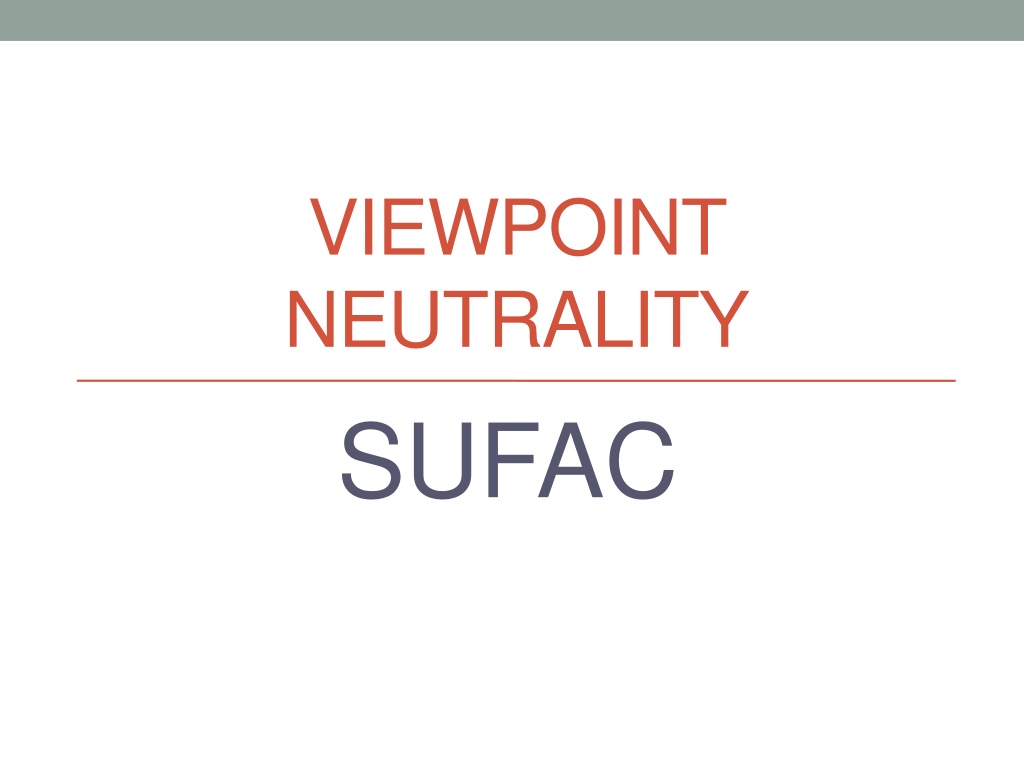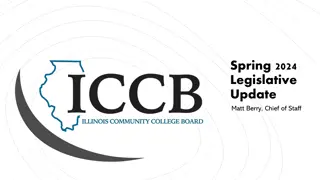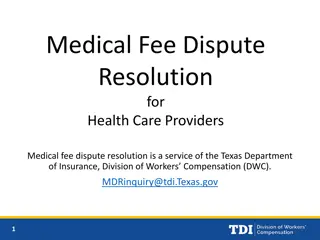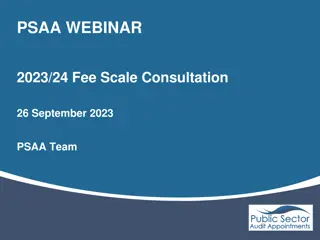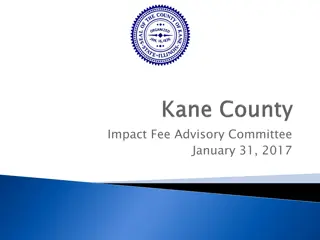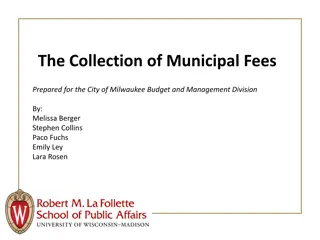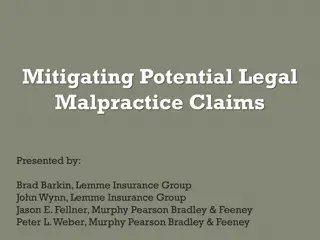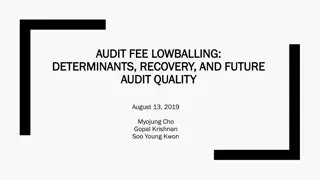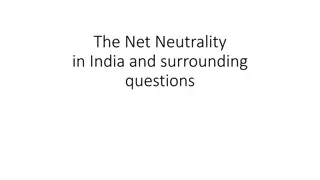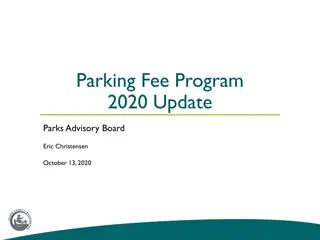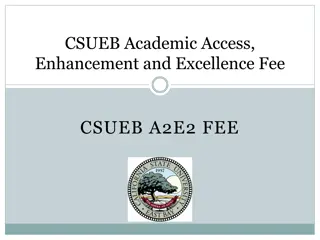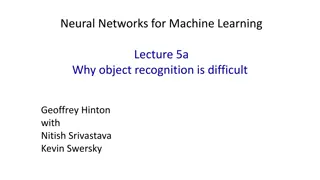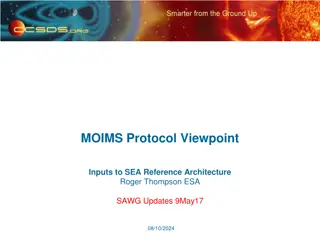Understanding Viewpoint Neutrality in Student Fee Allocations
Explore the concept of viewpoint neutrality in student fee allocations, focusing on the U.S. Supreme Court's decision in Southworth v. Board of Regents. Learn about the constitutional mandate for public institutions to remain neutral in funding decisions and the history behind the Southworth case. Discover practical applications and scenarios related to maintaining viewpoint neutrality in educational settings.
Download Presentation

Please find below an Image/Link to download the presentation.
The content on the website is provided AS IS for your information and personal use only. It may not be sold, licensed, or shared on other websites without obtaining consent from the author. Download presentation by click this link. If you encounter any issues during the download, it is possible that the publisher has removed the file from their server.
E N D
Presentation Transcript
VIEWPOINT NEUTRALITY SUFAC
Overview of Program What is Viewpoint Neutrality ? Brief overview of U.S. Supreme Court s decision in Southworth v. Board of Regents Practical Application of Southworth decision Scenarios
Disclaimer Offering general tips and information on viewpoint neutrality Discussion and information provided herein is not legal advice Scenarios are hypothetical in nature If a real issue arises, we contact Student Affairs or legal counsel
Viewpoint Neutrality A neutral point of view is neither sympathizing with nor disparaging the subject. The neutrality principle prevents public universities from discriminating against student orgs on the basis of the views they express.
Introduction An understanding of Southworth v. Board of Regents is necessary in order to ensure that students who are involved in actual funding decisions comply with constitutional mandates. (Southworth v. Board of Regents of the Univ. of Wis. System, 529 U.S. 217 (2000))
What is the Constitutional Mandate? 1stAmendment of the U.S. Constitution creates a constitutional right to Freedom of Speech and Freedom of Association. A public institution must remain viewpoint neutral when making decisions regarding fee allocations to student groups or organizations. SUFAC which makes recommendations/decisions on fee allocations must not base its decision on the viewpoints espoused (expressed) by a group or organization.
History of Southworth A group of concerned students challenged UW- Madison s allocation of segregated fees, claiming that it was unconstitutional to compel them to financially support groups that espoused political and ideological views with which they did not agree. A court ruled that the fee system in place at that time was unconstitutional on the grounds that the process was not operated in a viewpoint-neutral manner. Viewpoint neutrality means that the viewpoint espoused by the group is not taken into consideration when making funding decisions. The law suite stated there was no viewpoint-neutrality which violated the First Amendment right to the freedom of speech and association.
Southworth History Cont. In a subsequent related case, a court ruled that Madison s segregated fee funding system is constitutional as long as students do not have unbridled discretion in the allocation of student fees. Ability to grant preferential treatment to favored student orgs. Madison s system avoided unbridled discretion because of objective/viewpoint neutral criteria for evaluating fee requests and a comprehensive appeals process. The court also found it helpful that the student government participated in viewpoint neutrality training.
Supreme Court Finding US Supreme Court unanimously allowed the collection of mandatory student activities fees by the University of Wisconsin System only if they are spent in a viewpoint-neutral manner without bias toward programs.
Practical Application of Decisions Decision-makers should not have unbridled discretion. Have objective rules in place Maintain checks and balances Review and/or appeal process Appeal to the Chancellor Compare grant amounts to determine whether similar organizations were treated equally and fairly. NOTE: Similar does not mean that the organization had the same purpose, but rather whether requests were similar in nature.
Practical Applications Cont. DO OPERATE IN A VIEWPOINT NEUTRAL MANNER BY: Establishing eligibility criteria that is neutral on its face: Must be unrelated to viewpoint/content of group s speech. Must not have effect of excluding unpopular minority viewpoints. Considering use of funding application and attached budget(s), and apply common sense and fairness to those documents to determine whether to grant funding.
Practical Application of Decisions DO NOT consider the viewpoints espoused by the group when considering fee allocation Jazz club vs. country-western club Men s rugby team vs. women s tennis team Democrats vs. Independents A group s participation in an event that includes speakers on women s rights A religious group that holds an event to raise awareness on abortion
SCENARIO # 1 Joe and Susie have been on the student financial affairs committee for the past 3 years. They have watched a highly popular student organization s funding levels increase each year. Because of their experience on the committee, Joe and Susie are well aware of this organization s prior requests, justifications and expenditures. They are both concerned that the funding is getting excessive merely because the group keeps seeking new events and opportunities on and off campus. Joe and Susie want to educate the new committee members so that they don t automatically buy into the next funding request, which they expect will be more than $20,000 above last year s budget.
SCENARIO # 1 (Cont.) Q: Is this group s previous budget information appropriate for the committee to discuss among themselves during the funding reviews? Q: Can a committee member share their thoughts and opinions about a group s prior activities during the budget review?
SCENARIO # 2 Joe and Susie have served on SUFAC for a few years together. In the past year, Joe has confided in Susie that he will never support a particular organization because it is against his religious beliefs. In the past, when the organization s budget request came up for review, Joe always came up with a minor, but unrelated reason for voting to deny the request. The group s budget is up for review. Susie isn t sure what to do. Q: Should Susie do anything? If so, what?
SCENARIO # 3 A student organization presents a budget request to the SUFAC in which it proposes 10 events for the upcoming year with 10 presenters, including $XXX amount for travel, hotel and cab fare. In justifying the amount sought, the organization explains that these 10 events are necessary for the organization to fulfill its mission and meet its overall objectives as a group. Q: What if the SUFAC disagrees with the number of events?
SCENARIO # 4 A student jazz club has specific requirements in order to properly maintain its musical instruments. This year, the club has decided that because it has been playing more often as a club, additional tuning/maintenance is required. It now seeks 3 times the amount for maintenance from last year. Q: If a few SUFAC members disagree with the increase on the basis that they believe it is unnecessary, does this create a VPN issue?
SCENARIO # 5 A student organization has had the same advisor for many years. The group and the advisor are very close. The advisor has recently revealed to the organization that he is in serious financial trouble. A few weeks later, the organization proposed its funding request to the SUFAC and requests additional funds in the amount of $2000 as a gift for its advisor. The SUFAC reviews this organization s request last and decides that there is just enough money left for such a one-time gift. Q: Is this an appropriate use of funds?
SCENARIO # 6 A member of the SUFAC has been frustrated with the funding approval process, policy restrictions, and the ongoing concern about violating VPN. She talks with other members and is considering quitting. Q: What should the member do?
SCENARIO # 7 Susie is an officer for a student organization on campus. This year, she became a member of the campus SUFAC. Susie is highly ethical, very fair and would never make decisions on a matter in an improper or unfair way (which is why she joined SUFAC). The student organization has submitted a request for funding this year, similar to previous years. Susie, being fair and just, engages in the funding deliberations for each request, including the organization to which she is an officer. Q: Does Susie s involvement in the deliberations for funding the organization for which she is an officer create an issue?
SCENARIO # 8 The SUFAC members have been having discussions lately about the Southworth decision and constitutional rights of organizations. One of the SUFAC members has decided that the safest thing to do is to fund every group an equal amount every year. That way, there can be no claim that one group was treated differently than another. Plus, it makes the process go quickly. Q: The other members disagree with this approach but are also concerned about funding one organization more than another. What should they do?
SCENARIO # 9 A new club has requested funding this year. The club only has about 15 members so far, has not established a strong presence on campus yet, and likely, any funding provided will only benefit a very small amount of the campus population this year. Q: If the student committee denies the request based upon its assumption that the club isn t ready yet or won t be successful, does it create a viewpoint neutrality concern?
SCENARIO # 10 A SUFAC committee is reviewing a club s request for funding. The club has been in operation for 5 years. Last year, the committee approved a significant amount for this club because it was invited to compete in a national tournament. The club is seeking another significant amount this year for another tournament in New York. Upon reviewing this request, the committee learned that last year, the club only needed 6 members to compete in the conference, but sent its officers as well because it had the funds left over to do so.
SCENARIO # 10 (Cont.) Q: What factors should the committee consider in making its decision? Q: What if the opposite were true and the club had only spent of its approved budget from last year, but now wants the full amount again? Should the committee consider this?
SCENARIO # 11 A new RSO applies for funding. During deliberations, a committee member decides to vote not to approve the funding request because it has no track record and the committee member doesn t know what the organization will really do with the money. Q: Is this permissible under viewpoint neutrality?
SCENARIO # 12 A member of the SUFAC knows members of an RSO that is requesting funding and tells them not to worry about funding because he is sympathetic to their cause. Q: Is this a potential viewpoint neutrality violation?
SCENARIO # 13 Out of a total of fifty RSOs applying for funding, six submit late applications. The SUFAC wants to extend the deadline for two because SUFAC members are friends with members of those two organizations and not with the others. Q: Is this a potential viewpoint neutrality concern?
SCENARIO # 14 A campus SUFAC has a total budget of $100,000 for the 2012-2013 funding year. In the past, the student committee has been able to approve each group s funding request. This year, there are 5 new groups seeking funding. If the student committee funds the previous groups in a similar fashion, there will not be enough funds left over for 2 of the new groups. Q: Is there a viewpoint neutrality issue present?
SCENARIO # 15 A popular student organization is seeking funding this year. Part of its funding request includes a campus function involving a Republican representative who will come speak to the campus about the recent economy and its impact on college graduates. In addition, the organization will also be recruiting new members as a part of this event. The funding request includes $5000 for food to be served during the function. The student committee has concerns about this food expense, but wants to support the function because a majority of the student committee members are highly supportive of Republican views.
SCENARIO # 15 (Cont.) Q: If the student committee approves the funding request even though they truly believe the food cost is excessive, is there a viewpoint neutrality violation? Q: Are there other concerns with this event?
A Few Final Thoughts VPN does not require One Size Fits All . Can consider each organization, club and event on a case-by-case basis. VPN does require SUFAC to avoid making funding decisions on the basis of viewpoints, opinions, political interests and personal beliefs of a group, organization or club. SUFAC should work with Student Affairs Staff and vice versa to address questions/concerns. Goal is to have a Viewpoint Neutral Allocation! Be Fair!
QUESTIONS? Thank You For Your Participation!
